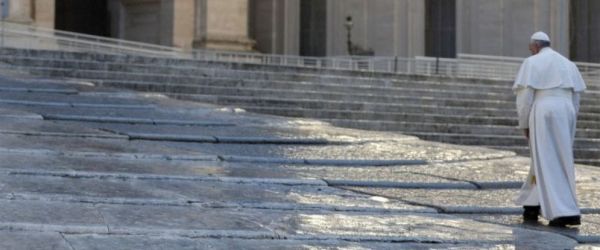This passage from the Gospel of John (cf. 12:44-50) shows us the intimacy there was between Jesus and the Father. Jesus did what the Father told Him to do. And therefore He says: “He who believes in me, believes not in me but in Him who sent me” (v. 44). He then explains His mission: “I have come as light into the world, that whoever believes in me may not remain in darkness” (v. 46). He presents himself as light. Jesus’s mission is to enlighten: light. He himself said: “I am the light of the world” (Jn 8:12). The Prophet Isaiah prophesied this light: “The people who walked in darkness have seen a great light” (9:1). The promise of the light that will enlighten the people. And the mission of the Apostles too was to bring light. Paul said to King Agrippa: “I was chosen to enlighten, to bring this light – which is not mine, but another’s – but to bring light” (cf. Acts 26:18). It is Jesus’s mission: to bring light. And the mission of the Apostles was to bring the light of Jesus. To enlighten. Because the world was in darkness.
But the tragedy of Jesus’s light is that it was rejected. From the beginning of the Gospel, John said it clearly: “He came to His own home, and His own people did not welcome Him. They loved darkness more than light' (cf. Jn 1:9-11). Being accustomed to darkness, living in darkness: they did not know how to accept the light, they could not; they were slaves to darkness. And this would be Jesus’s continuous battle: to enlighten, to bring the light that shows things as they are, as they exist; it shows freedom, it shows truth, it shows the path on which to go with the light of Jesus.
Paul had this experience of the passage from darkness to light, when the Lord encountered him on the road to Damascus. He was blinded. Blind. The Lord’s light blinded him. And then, when a few days had passed, with baptism, he regained the light (cf. Acts 9:1-19). He had this experience of passing from darkness, in which he was, to the light. And our passage too, which we received sacramentally in Baptism: for this reason Baptism was called, in the first centuries, the Illumination (cf. Saint Justin, Apology I, 61, 12), because it gave you the light, it “let it enter” you. For this reason, in the ceremony of Baptism we give a lit blessed candle, a lit candle to the mother and father, because the little boy or the little girl is enlightened.
Jesus brings light. But the people, His people rejected it. They were so accustomed to the darkness that the light blinded them, they did not know where to go… (cf. Jn 1:1-11). And this is the tragedy of our sin: sin blinds us and we cannot tolerate the light. Our eyes are sick. And Jesus clearly states it in the Gospel of Matthew: “If your eye is not sound, your whole body will be unsound. If your eye sees only darkness, how great is the darkness within you!” (cf. Mt 6:22-23). Darkness… And conversion is passing from darkness to light.
But what are the things that sicken the eyes, the eyes of faith? Our eyes are ill: what are the things that “drag them down”, that blind them? Vices, the worldly spirit, pride. The vices that “drag you down” and also these three things – vices, pride, the worldly spirit – lead you to associate with others in order to remain secure in the darkness. We often speak of “mafias”: this is it. But there are “spiritual mafias”; there are “domestic mafias”, always, seeking someone else so as to cover yourself and remain in darkness. It is not easy to live in the light. The light shows many ugly things within us that we do not want to see: vices, sins… Let us think about our vices; let us think about our pride; let us think about our worldly spirit: These things blind us; they distance us from Jesus’s light.
But if we start to think about these things, we will not find a wall, no. We will find a way out, because Jesus Himself says that He is the light, and also: “I have come into the world not to condemn the world, but to save the world” (cf. Jn 12:46-47). Jesus Himself, the light, says: “Take courage: let yourself be enlightened; let yourself see what you have within, because I have come to lead you forth, to save you. I do not condemn you. I save you” (cf. v. 47). The Lord saves us from the darkness we have within, from the darkness of daily life, of social life, of political life, of national, international life… There is so much darkness within. And the Lord saves us. But He asks us to see them, first; to have the courage to see our darkness so that the Lord's light may enter and save us.
Let us not fear the Lord: He is very good; He is meek; He is close to us. He has come to save us. Let us not be afraid of the light of Jesus.
[Pope Francis, homily st. Martha May 6, 2020]












